高考全国卷英语作文预测系列范文 一 传统节假日
节假日的高考英语应用文
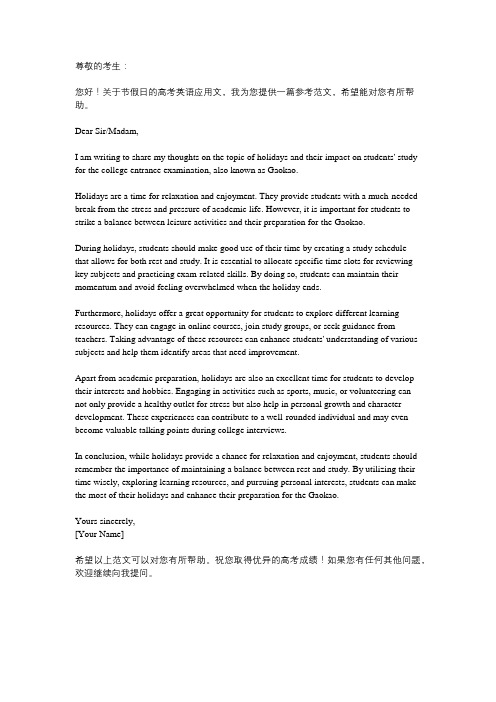
尊敬的考生:您好!关于节假日的高考英语应用文,我为您提供一篇参考范文,希望能对您有所帮助。
Dear Sir/Madam,I am writing to share my thoughts on the topic of holidays and their impact on students' study for the college entrance examination, also known as Gaokao.Holidays are a time for relaxation and enjoyment. They provide students with a much-needed break from the stress and pressure of academic life. However, it is important for students to strike a balance between leisure activities and their preparation for the Gaokao.During holidays, students should make good use of their time by creating a study schedulethat allows for both rest and study. It is essential to allocate specific time slots for reviewing key subjects and practicing exam-related skills. By doing so, students can maintain their momentum and avoid feeling overwhelmed when the holiday ends.Furthermore, holidays offer a great opportunity for students to explore different learning resources. They can engage in online courses, join study groups, or seek guidance from teachers. Taking advantage of these resources can enhance students' understanding of various subjects and help them identify areas that need improvement.Apart from academic preparation, holidays are also an excellent time for students to develop their interests and hobbies. Engaging in activities such as sports, music, or volunteering cannot only provide a healthy outlet for stress but also help in personal growth and character development. These experiences can contribute to a well-rounded individual and may even become valuable talking points during college interviews.In conclusion, while holidays provide a chance for relaxation and enjoyment, students should remember the importance of maintaining a balance between rest and study. By utilizing their time wisely, exploring learning resources, and pursuing personal interests, students can make the most of their holidays and enhance their preparation for the Gaokao.Yours sincerely,[Your Name]希望以上范文可以对您有所帮助。
中华传统节假日英语作文
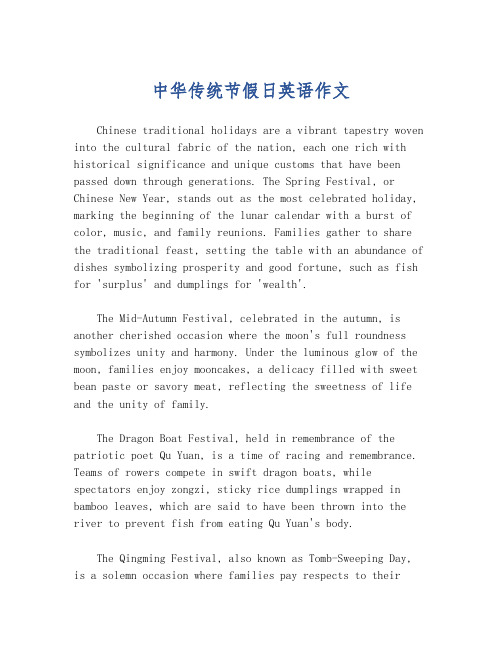
中华传统节假日英语作文Chinese traditional holidays are a vibrant tapestry woven into the cultural fabric of the nation, each one rich with historical significance and unique customs that have been passed down through generations. The Spring Festival, or Chinese New Year, stands out as the most celebrated holiday, marking the beginning of the lunar calendar with a burst of color, music, and family reunions. Families gather to share the traditional feast, setting the table with an abundance of dishes symbolizing prosperity and good fortune, such as fish for 'surplus' and dumplings for 'wealth'.The Mid-Autumn Festival, celebrated in the autumn, is another cherished occasion where the moon's full roundness symbolizes unity and harmony. Under the luminous glow of the moon, families enjoy mooncakes, a delicacy filled with sweet bean paste or savory meat, reflecting the sweetness of life and the unity of family.The Dragon Boat Festival, held in remembrance of the patriotic poet Qu Yuan, is a time of racing and remembrance. Teams of rowers compete in swift dragon boats, while spectators enjoy zongzi, sticky rice dumplings wrapped in bamboo leaves, which are said to have been thrown into the river to prevent fish from eating Qu Yuan's body.The Qingming Festival, also known as Tomb-Sweeping Day, is a solemn occasion where families pay respects to theirancestors, cleaning graves and offering food, flowers, and incense to honor their memory and express gratitude for their legacy.These holidays not only serve as a time for celebration and remembrance but also as a testament to the enduringspirit and traditions of the Chinese people, a living connection to the past that shapes the present and guides the future.。
中国传统节日英文作文高考
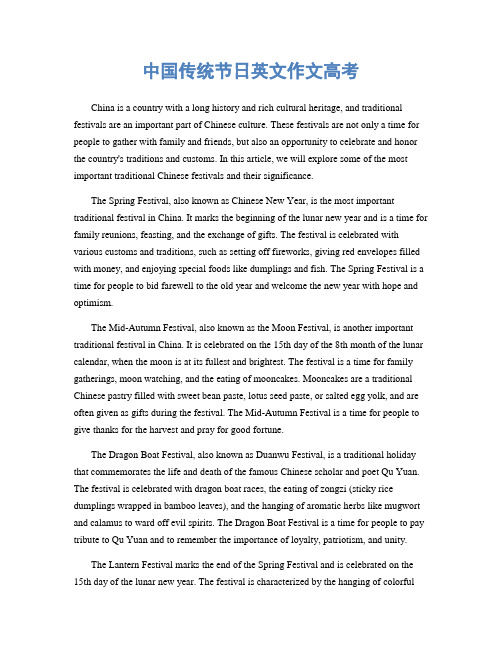
中国传统节日英文作文高考China is a country with a long history and rich cultural heritage, and traditional festivals are an important part of Chinese culture. These festivals are not only a time for people to gather with family and friends, but also an opportunity to celebrate and honor the country's traditions and customs. In this article, we will explore some of the most important traditional Chinese festivals and their significance.The Spring Festival, also known as Chinese New Year, is the most important traditional festival in China. It marks the beginning of the lunar new year and is a time for family reunions, feasting, and the exchange of gifts. The festival is celebrated with various customs and traditions, such as setting off fireworks, giving red envelopes filled with money, and enjoying special foods like dumplings and fish. The Spring Festival is a time for people to bid farewell to the old year and welcome the new year with hope and optimism.The Mid-Autumn Festival, also known as the Moon Festival, is another important traditional festival in China. It is celebrated on the 15th day of the 8th month of the lunar calendar, when the moon is at its fullest and brightest. The festival is a time for family gatherings, moon watching, and the eating of mooncakes. Mooncakes are a traditional Chinese pastry filled with sweet bean paste, lotus seed paste, or salted egg yolk, and are often given as gifts during the festival. The Mid-Autumn Festival is a time for people to give thanks for the harvest and pray for good fortune.The Dragon Boat Festival, also known as Duanwu Festival, is a traditional holiday that commemorates the life and death of the famous Chinese scholar and poet Qu Yuan. The festival is celebrated with dragon boat races, the eating of zongzi (sticky rice dumplings wrapped in bamboo leaves), and the hanging of aromatic herbs like mugwort and calamus to ward off evil spirits. The Dragon Boat Festival is a time for people to pay tribute to Qu Yuan and to remember the importance of loyalty, patriotism, and unity.The Lantern Festival marks the end of the Spring Festival and is celebrated on the 15th day of the lunar new year. The festival is characterized by the hanging of colorfullanterns, the eating of tangyuan (sweet glutinous rice balls), and the solving of riddles written on lanterns. The Lantern Festival is a time for people to enjoy the beautiful lantern displays, make wishes for the future, and pray for good luck and happiness.In conclusion, traditional Chinese festivals are an integral part of the country's cultural heritage and play an important role in bringing people together, preserving traditions, and promoting values such as family, unity, and gratitude. These festivals are not only a time for celebration, but also an opportunity to reflect on the past and look forward to the future. As China continues to modernize and develop, it is important to cherish and uphold these traditional festivals as they are an essential part of the country's identity and history.。
英文作文传统节假日模板

英文作文传统节假日模板Traditional Holiday Template。
Introduction:Traditional holidays are an essential part of every culture. They are a time for people to come together, celebrate, and honor their heritage. Whether it's a religious holiday, a national holiday, or a cultural festival, traditional holidays are an opportunity for people to connect with their roots and take part in time-honored customs and traditions.History and Origins:The history and origins of traditional holidays are often deeply rooted in the culture and history of a particular society. For example, Christmas is a Christian holiday that celebrates the birth of Jesus Christ, while Chinese New Year is a traditional Chinese holiday that marks the beginning of the lunar new year. Understanding the history and origins of traditional holidays is important for appreciating their significance and meaning.Customs and Traditions:Traditional holidays are often characterized by specific customs and traditions that have been passed down from generation to generation. These customs and traditions can include special foods, rituals, ceremonies, and decorations. For example, during the Thanksgiving holiday in the United States, it is customary to have a feast with turkey and pumpkin pie, while during Diwali in India, people light oil lamps and set off fireworks to celebrate the victory of light over darkness.Family and Community:Traditional holidays are a time for families and communities to come together and celebrate. They provide an opportunity for people to strengthen their bonds with loved ones and connect with others in their community. Whether it's through shared meals, gift-giving, or religious ceremonies, traditional holidays often emphasize the importance of family and community.Cultural Significance:Traditional holidays are an important way for people to express and preserve their cultural identity. They are a time to showcase and celebrate the unique customs, beliefs, and values of a particular culture. Traditional holidays can also serve as a way to educate younger generations about their heritage and instill a sense of pride in their cultural identity.Modern Celebrations:While traditional holidays are steeped in history and tradition, they also continue to evolve and adapt to modern times. As societies change and develop, so too do the ways in which traditional holidays are celebrated. For example, the way people celebrate Christmas today may be different from how it was celebrated centuries ago. Modern celebrations often incorporate new customs and traditions while still honoring the roots of the holiday.Conclusion:Traditional holidays play a vital role in preserving and celebrating cultural heritage. They provide a sense of continuity and connection to the past while also serving as a way for people to come together and celebrate. Whether it's through religious observance, community gatherings, or family traditions, traditional holidays are a time to honor the customs and traditions that have been passed down through generations. As we continue to celebrate these holidays, it is important to remember their history and significance in our lives.。
传统节假日英语作文

传统节假日英语作文英文回答:Traditional holidays are a significant part of acountry's cultural heritage, offering valuable insightsinto its history, customs, and social values. These special occasions serve as an opportunity for people to come together, celebrate their shared identity, and commemorate important events or individuals. From grand religious festivals to harvest celebrations and ancestral commemorations, traditional holidays provide a window into the collective memory and spirit of a nation.One of the most notable aspects of traditional holidays is their ability to foster a sense of community and belonging. As people participate in shared rituals, customs, and activities, they strengthen their bonds with oneanother and reaffirm their membership within a particular social group. These holidays become a time for family reunions, neighborhood gatherings, and public festivities,bringing together individuals from all walks of life.Beyond fostering community, traditional holidays also play an educational role. They serve as a repository of knowledge and cultural transmission, passing down stories, legends, and traditions from one generation to the next. Through storytelling, music, dance, and other cultural expressions, these holidays keep the past alive and provide a sense of continuity with the ancestors. They promote cultural literacy, instilling in participants an understanding of their history, values, and beliefs.Furthermore, traditional holidays often have aspiritual or religious significance. They are occasions for people to honor deities, ancestors, or other sacred figures. Religious rituals, ceremonies, and prayers are essential components of many traditional holidays, connecting participants with the divine and reinforcing spiritual beliefs.In addition to their social, educational, and spiritual functions, traditional holidays also have an economicimpact. They create opportunities for travel, tourism, and the sale of goods and services. Many local businesses rely on these holidays for a significant portion of their annual income.In conclusion, traditional holidays play a multifaceted role in societies around the world. They foster community, transmit culture, reinforce spiritual beliefs, andcontribute to the economy. By preserving and celebrating these special occasions, nations safeguard their unique heritage and provide a sense of continuity and belongingfor their citizens.中文回答:传统节日是一个国家文化遗产的重要组成部分,它可以深入洞察一个国家的历史、习俗和社会价值观。
高中生英语作文《中国的传统节日》
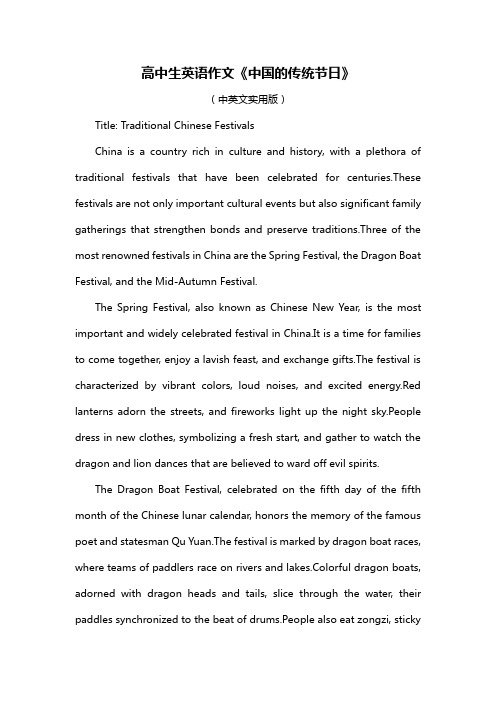
高中生英语作文《中国的传统节日》(中英文实用版)Title: Traditional Chinese FestivalsChina is a country rich in culture and history, with a plethora of traditional festivals that have been celebrated for centuries.These festivals are not only important cultural events but also significant family gatherings that strengthen bonds and preserve traditions.Three of the most renowned festivals in China are the Spring Festival, the Dragon Boat Festival, and the Mid-Autumn Festival.The Spring Festival, also known as Chinese New Year, is the most important and widely celebrated festival in China.It is a time for families to come together, enjoy a lavish feast, and exchange gifts.The festival is characterized by vibrant colors, loud noises, and excited energy.Red lanterns adorn the streets, and fireworks light up the night sky.People dress in new clothes, symbolizing a fresh start, and gather to watch the dragon and lion dances that are believed to ward off evil spirits.The Dragon Boat Festival, celebrated on the fifth day of the fifth month of the Chinese lunar calendar, honors the memory of the famous poet and statesman Qu Yuan.The festival is marked by dragon boat races, where teams of paddlers race on rivers and lakes.Colorful dragon boats, adorned with dragon heads and tails, slice through the water, their paddles synchronized to the beat of drums.People also eat zongzi, stickyrice dumplings wrapped in bamboo leaves, which are believed to prevent evil spirits from entering the home.The Mid-Autumn Festival, also known as the Moon Festival, is one of the most romantic festivals in China.Celebrated on the 15th day of the eighth lunar month, it falls during the full moon when the weather is cool and clear.Families gather to admire the full moon, share mooncakes, and tell stories about the moon.The festival is a time for couples to express their love and for families to wish for unity and nterns of various shapes and colors are lit up, adding a magical touch to the night.These festivals are not just excuses for a holiday but are deeply rooted in Chinese culture and heritage.They bring people together, fostering a sense of community and continuity.Through these festivals, China's rich and diverse history is passed down from generation to generation, ensuring that their cultural heritage remains alive and celebrated for years to come.。
传统节日春节高三作文英语
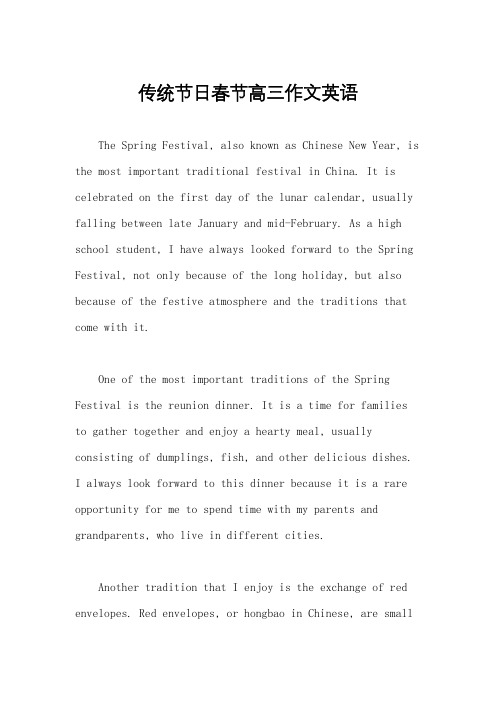
传统节日春节高三作文英语The Spring Festival, also known as Chinese New Year, is the most important traditional festival in China. It is celebrated on the first day of the lunar calendar, usually falling between late January and mid-February. As a high school student, I have always looked forward to the Spring Festival, not only because of the long holiday, but also because of the festive atmosphere and the traditions that come with it.One of the most important traditions of the Spring Festival is the reunion dinner. It is a time for families to gather together and enjoy a hearty meal, usually consisting of dumplings, fish, and other delicious dishes.I always look forward to this dinner because it is a rare opportunity for me to spend time with my parents and grandparents, who live in different cities.Another tradition that I enjoy is the exchange of red envelopes. Red envelopes, or hongbao in Chinese, are smallred packets filled with money. They are given as gifts during the Spring Festival, usually to children and unmarried adults. I remember feeling excited as a child when I received red envelopes from my relatives, and now I enjoy giving them to my younger cousins and family friends.In addition to these traditions, there are many other customs associated with the Spring Festival, such assetting off fireworks, wearing new clothes, and cleaning the house to sweep away bad luck. These traditions are deeply rooted in Chinese culture and have been passed down from generation to generation.However, the Spring Festival is not just about traditions and customs. It is also a time for reflection and renewal. As a high school student, I often use this time to set goals for the new year and reflect on my past achievements and shortcomings. It is a time for me to think about what I want to accomplish in the coming year and how I can improve myself.Overall, the Spring Festival is a time of joy,celebration, and reflection. It is a time for families to come together, for traditions to be passed down, and for new beginnings to be made. As a high school student, I cherish this festival and look forward to celebrating it with my loved ones every year.。
节假日与中华传统文化的英语作文题
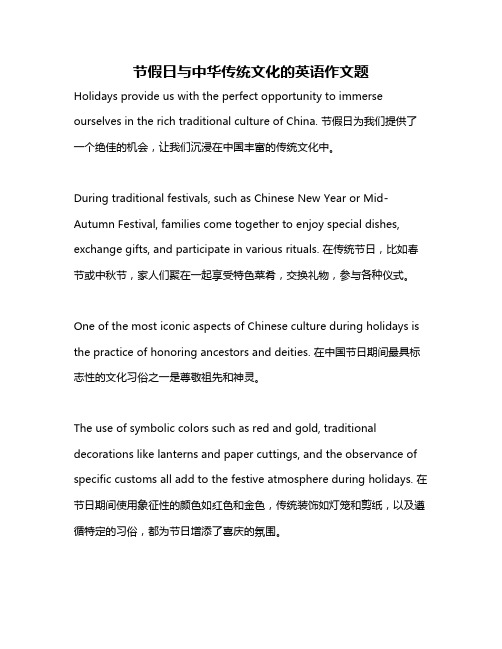
节假日与中华传统文化的英语作文题Holidays provide us with the perfect opportunity to immerse ourselves in the rich traditional culture of China. 节假日为我们提供了一个绝佳的机会,让我们沉浸在中国丰富的传统文化中。
During traditional festivals, such as Chinese New Year or Mid-Autumn Festival, families come together to enjoy special dishes, exchange gifts, and participate in various rituals. 在传统节日,比如春节或中秋节,家人们聚在一起享受特色菜肴,交换礼物,参与各种仪式。
One of the most iconic aspects of Chinese culture during holidays is the practice of honoring ancestors and deities. 在中国节日期间最具标志性的文化习俗之一是尊敬祖先和神灵。
The use of symbolic colors such as red and gold, traditional decorations like lanterns and paper cuttings, and the observance of specific customs all add to the festive atmosphere during holidays. 在节日期间使用象征性的颜色如红色和金色,传统装饰如灯笼和剪纸,以及遵循特定的习俗,都为节日增添了喜庆的氛围。
Through participating in traditional activities during holidays, individuals can gain a deeper understanding and appreciation for Chinese culture and values. 通过在节日期间参与传统活动,个人可以对中国文化和价值观有更深入的了解和欣赏。
传统节假日英语作文

The Importance of Traditional HolidaysIn the fast-paced world we live in, the significance of traditional holidays often goes unnoticed. These holidays, rich in history and culture, are not just a break from the routine of daily life but also a time for reflection, celebration, and family reunions.One of the most prominent aspects of traditional holidays is their ability to bring people together. Christmas, for instance, is a time for families to gather and exchange gifts, while the Chinese New Year is marked by large family gatherings and feasts. These holidays provide an opportunity for people to reconnect with their loved ones, share stories, and create memories that last a lifetime.Moreover, traditional holidays are a powerful reminder of our cultural identity. Each holiday is unique to a particular culture or religion, and celebrating them helps us understand and appreciate our own heritage. For example, the Diwali festival in India is a celebration of light and good over darkness and evil, symbolizing the victory of knowledge and wisdom. Such celebrations help us maintain a sense of belonging and connectedness to our community.Apart from cultural identity, traditional holidays also play a crucial role in education. They provide a platform for teaching younger generations about their history, traditions, and values. By participating in holiday rituals and activities, children learn about the significance of these traditions and how they have shaped the society they live in.In conclusion, traditional holidays are not just about taking a break from work or school. They are a time for celebration, reflection, and family reunions that help us connect with our heritage, values, and loved ones. In a world that is constantly changing, it is important to cherish these traditions and pass them down to future generations.。
关于2018年高考全国卷英语作文预测系列范文(一)传统节假日
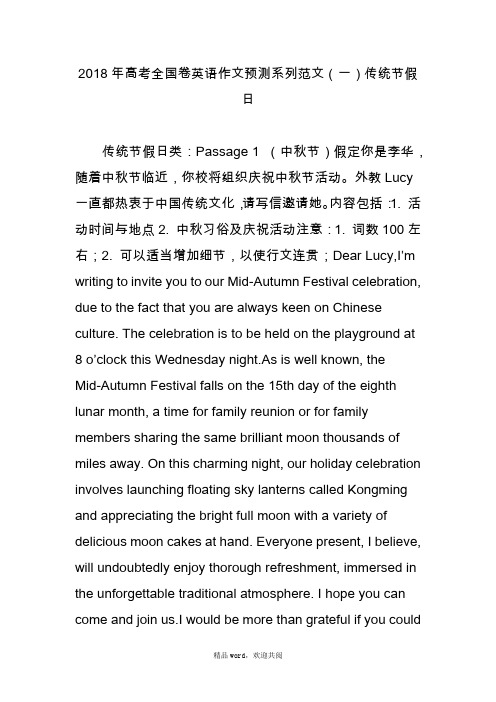
2018年高考全国卷英语作文预测系列范文(一)传统节假日传统节假日类:Passage 1 (中秋节)假定你是李华,随着中秋节临近,你校将组织庆祝中秋节活动。
外教Lucy 一直都热衷于中国传统文化,请写信邀请她。
内容包括:1. 活动时间与地点2. 中秋习俗及庆祝活动注意:1. 词数100左右;2. 可以适当增加细节,以使行文连贯;Dear Lucy,I’m writing to invite you to our Mid-Autumn Festival celebration, due to the fact that you are always keen on Chinese culture. The celebration is to be held on the playground at 8 o’clock this Wednesday night.As is well known, theMid-Autumn Festival falls on the 15th day of the eighth lunar month, a time for family reunion or for family members sharing the same brilliant moon thousands of miles away. On this charming night, our holiday celebration involves launching floating sky lanterns called Kongming and appreciating the bright full moon with a variety of delicious moon cakes at hand. Everyone present, I believe, will undoubtedly enjoy thorough refreshment, immersed in the unforgettable traditional atmosphere. I hope you can come and join us.I would be more than grateful if you couldwrite back soon.Yours,Li Hua传统节假日类:Passage 2(端午节)假定你是李华。
一篇英语作文关于中国春节的高中生

一篇英语作文关于中国春节的高中生English: Chinese Spring Festival, also known as Lunar New Year, is the most significant traditional festival in China. It is a time for family reunions, delicious food, vibrant decorations, and joyful celebrations. During this holiday, people from all over the country travel back to their hometowns to be with their families, resulting in the world's largest annual human migration. The streets are filled with red lanterns, couplets, and paper-cuttings, creating a festive atmosphere. Families gather for a lavish reunion dinner on the Eve of the Spring Festival, where they enjoy various dishes symbolizing prosperity and good luck. Children receive red envelopes containing money from their elders as a token of good fortune. Fireworks and firecrackers light up the night sky, warding off evil spirits and welcoming the new year. The festival lasts for 15 days, with various customs and activities taking place throughout, such as dragon dances, lion dances, and temple fairs.中文翻译: 中国春节,也被称为农历新年,是中国最重要的传统节日。
高考英语优秀作文中国传统节日
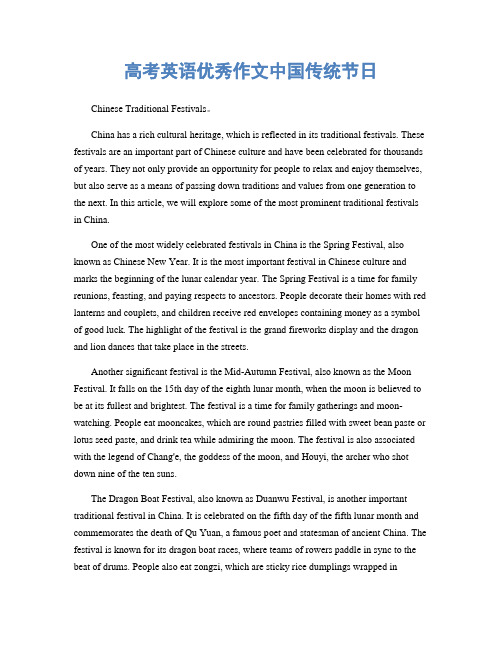
高考英语优秀作文中国传统节日Chinese Traditional Festivals。
China has a rich cultural heritage, which is reflected in its traditional festivals. These festivals are an important part of Chinese culture and have been celebrated for thousands of years. They not only provide an opportunity for people to relax and enjoy themselves, but also serve as a means of passing down traditions and values from one generation to the next. In this article, we will explore some of the most prominent traditional festivals in China.One of the most widely celebrated festivals in China is the Spring Festival, also known as Chinese New Year. It is the most important festival in Chinese culture and marks the beginning of the lunar calendar year. The Spring Festival is a time for family reunions, feasting, and paying respects to ancestors. People decorate their homes with red lanterns and couplets, and children receive red envelopes containing money as a symbol of good luck. The highlight of the festival is the grand fireworks display and the dragon and lion dances that take place in the streets.Another significant festival is the Mid-Autumn Festival, also known as the Moon Festival. It falls on the 15th day of the eighth lunar month, when the moon is believed to be at its fullest and brightest. The festival is a time for family gatherings and moon-watching. People eat mooncakes, which are round pastries filled with sweet bean paste or lotus seed paste, and drink tea while admiring the moon. The festival is also associated with the legend of Chang'e, the goddess of the moon, and Houyi, the archer who shot down nine of the ten suns.The Dragon Boat Festival, also known as Duanwu Festival, is another important traditional festival in China. It is celebrated on the fifth day of the fifth lunar month and commemorates the death of Qu Yuan, a famous poet and statesman of ancient China. The festival is known for its dragon boat races, where teams of rowers paddle in sync to the beat of drums. People also eat zongzi, which are sticky rice dumplings wrapped inbamboo leaves. The festival is believed to ward off evil spirits and bring good luck and protection.In addition to these major festivals, there are many other traditional festivals celebrated throughout China. For example, the Lantern Festival marks the end of the Spring Festival and is celebrated with lantern displays and the solving of riddles written on lanterns. The Qingming Festival, also known as Tomb-Sweeping Day, is a time for people to pay respects to their ancestors by visiting their graves and making offerings. The Double Ninth Festival is a day to honor the elderly and is celebrated with activities such as hiking and appreciating chrysanthemum flowers.In conclusion, Chinese traditional festivals play a significant role in preserving and promoting Chinese culture. They provide a platform for people to come together, celebrate, and pass down traditions from one generation to the next. These festivals not only showcase the rich history and customs of China, but also serve as a reminder of the importance of family, unity, and respect for one's heritage. As China continues to modernize, it is crucial to preserve and cherish these traditions, as they are an integral part of the country's identity.。
介绍传统节假日英语作文
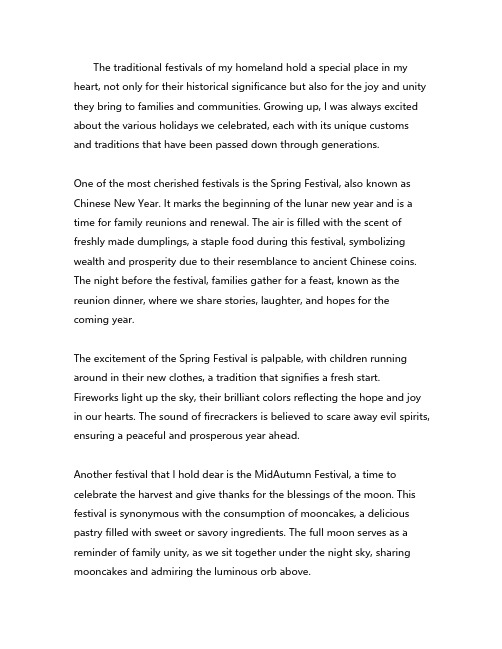
The traditional festivals of my homeland hold a special place in my heart, not only for their historical significance but also for the joy and unity they bring to families and communities. Growing up, I was always excited about the various holidays we celebrated, each with its unique customs and traditions that have been passed down through generations.One of the most cherished festivals is the Spring Festival, also known as Chinese New Year. It marks the beginning of the lunar new year and is a time for family reunions and renewal. The air is filled with the scent of freshly made dumplings, a staple food during this festival, symbolizing wealth and prosperity due to their resemblance to ancient Chinese coins. The night before the festival, families gather for a feast, known as the reunion dinner, where we share stories, laughter, and hopes for the coming year.The excitement of the Spring Festival is palpable, with children running around in their new clothes, a tradition that signifies a fresh start. Fireworks light up the sky, their brilliant colors reflecting the hope and joy in our hearts. The sound of firecrackers is believed to scare away evil spirits, ensuring a peaceful and prosperous year ahead.Another festival that I hold dear is the MidAutumn Festival, a time to celebrate the harvest and give thanks for the blessings of the moon. This festival is synonymous with the consumption of mooncakes, a delicious pastry filled with sweet or savory ingredients. The full moon serves as a reminder of family unity, as we sit together under the night sky, sharing mooncakes and admiring the luminous orb above.During this festival, I often participate in lantern lighting, a beautiful tradition that adds a warm glow to the streets and homes. The lanterns come in various shapes and sizes, each one a beacon of hope and happiness. Its a time when we reflect on our relationships and express gratitude for the love and support we receive.The Dragon Boat Festival is yet another vibrant holiday that I look forward to. It commemorates the life and death of the famous poet Qu Yuan and is celebrated with a series of exciting events. The most thrilling of these is undoubtedly the dragon boat races, where teams of rowers paddle furiously to the beat of drums, their boats adorned with vibrant dragon heads and tails. The sight of these boats slicing through the water is a spectacle that never fails to inspire a sense of camaraderie and determination.In addition to the races, the Dragon Boat Festival is also a time for making and eating zongzi, a type of sticky rice dumpling wrapped in bamboo leaves. The process of making zongzi is a family affair, with each person contributing to the preparation, which strengthens our bonds and creates lasting memories.These traditional holidays are more than just celebrations they are a living testament to our culture and history. They serve as a bridge between the past and the present, allowing us to connect with our ancestors and understand the values that have shaped our society. The stories, rituals, and foods associated with these festivals are an integral part of ouridentity, and its a joy to share them with others.As I grow older, I find myself taking on a more active role in preserving and passing on these traditions. I believe its crucial to keep these customs alive, not only for the sake of our heritage but also for the sense of community and continuity they provide. In a world thats rapidly changing, these festivals offer a sense of stability and a reminder of the enduring spirit of our people.In conclusion, traditional holidays are a tapestry of colors, flavors, and emotions that enrich our lives. They are a celebration of our shared heritage and a testament to the resilience and unity of our people. As I look back on my experiences, I am filled with gratitude for the opportunity to be part of these celebrations and to carry forward the legacy of our ancestors.。
高考英语作文之传统文化端午节
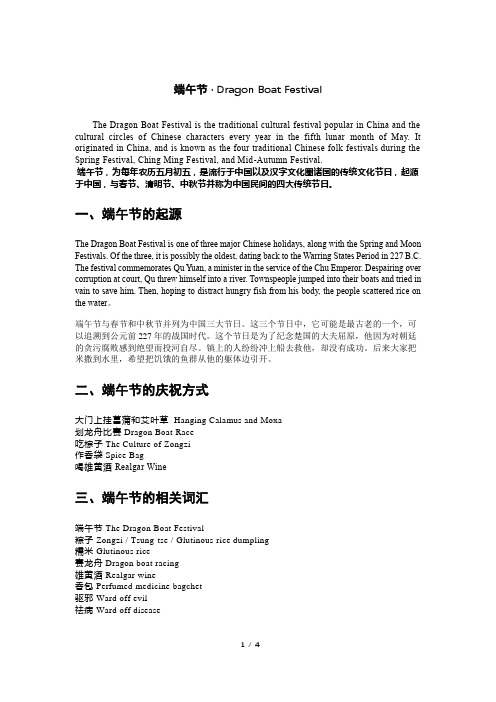
端午节·Dragon Boat FestivalThe Dragon Boat Festival is the traditional cultural festival popular in China and the cultural circles of Chinese characters every year in the fifth lunar month of May. It originated in China, and is known as the four traditional Chinese folk festivals during the Spring Festival, Ching Ming Festival, and Mid-Autumn Festival.端午节,为每年农历五月初五,是流行于中国以及汉字文化圈诸国的传统文化节日,起源于中国,与春节、清明节、中秋节并称为中国民间的四大传统节日。
一、端午节的起源The Dragon Boat Festival is one of three major Chinese holidays, along with the Spring and Moon Festivals. Of the three, it is possibly the oldest, dating back to the Warring States Period in 227 B.C. The festival commemorates Qu Yuan, a minister in the service of the Chu Emperor. Despairing over corruption at court, Qu threw himself into a river. Townspeople jumped into their boats and tried in vain to save him. Then, hoping to distract hungry fish from his body, the people scattered rice on the water。
2022年高考热门话题写作预测(14):节假日与中国传统文化

2022年高考热门话题写作预测(14):节假日与中国传统文化作者:蒋建平来源:《疯狂英语·新策略》2021年第11期玉. 读典题·知考向假定你是李华,你的美国网友Jim来信询问当前中国过春节的情况。
请你根据以下要点给他写一封回信。
1. 中国人越来越重视春节;2. 春节活动更具环保性和人文性。
注意:1. 词数80左右;2. 可以适当增加细节,以使行文连贯;3. 开头和结尾已给出,不计入总词数。
Dear Jim,How is everything? Im more than happy to receive your letter.Best wishes.Yours,Li Hua◆范文晨诵Dear Jim,How is everything? Im more than happy to receive your letter. You asked me about the current condition of the Spring Festival in China.As is known to all, the Spring Festival plays an important role in China. With the development of our society, people come to realize that it is not only a festival but also a treasure. Therefore,people pay attention to how to celebrate the festival more meaningfully as well as how to protect the environment. As you can see, to protect our environment, more and more people prefer electronic firecrackers to traditional ones.Look forward to learning something about your Christmas Day.Best wishes.Yours,Li Hua◆模板提炼如何介绍节假日(节日名称) falls on(日期). As one of the traditional Chinese festivals, it has been enjoying great popularity in our country. Usually, no matter how far away or how busy we are, we will try to return home for the celebration.(描写节日气氛). What we love most is(节日特色).(描述节日活动). In addition to these traditional activities, we have a wider range of choices such as (节日活动类型).◆靓句积累1. 多亏了这次旅行,我们不仅提高了口语技巧,而且对中国文化有了更好的理解。
全国卷高考英语范文节假日活动
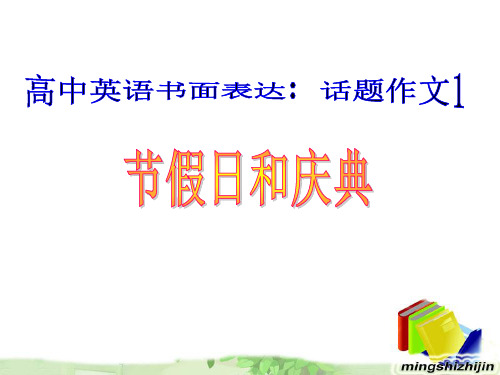
• 4. Thanksgiving Day is a very important traditional festival in the USA, which is similar to Chinese Mid-Autumn Festival and celebrates the year’s harvest .
(7)Custom required our dressing for dinner. 礼 俗要求我们参加宴会穿礼服。
(8) It is an old custom that
It is the custom (for …)to …. …是个(老)风俗
It is the custom to dye eggs at Easter. (9)Social customs vary/are different greatly
14. Generally speaking, people can have seven days off for the Chinese Lunar New Year.一般来说,人们在农历新年有七天假。
ten-day vacation/holiday: 十天的假期
have … day(s) off: 放假 …… 天 in honor of/in memory of 为了纪念 be decorated with: 用 …… 装饰 be introduced into: 被引进 exchange gifts: 交换礼物
高考全国卷英语作文预测系列范文(一)传统节假日
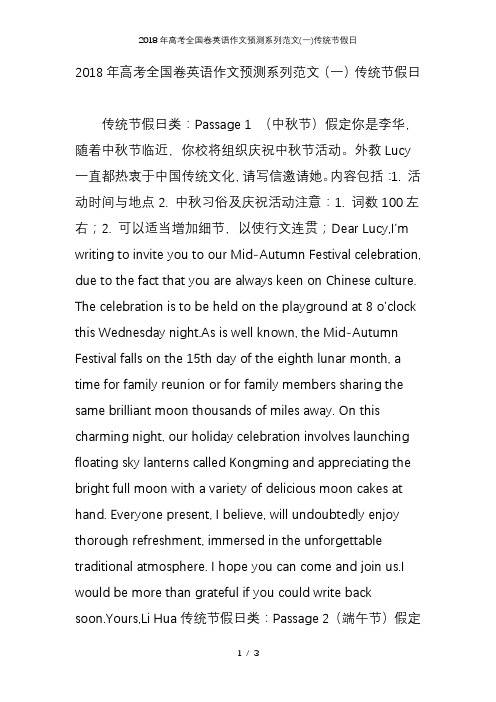
2018年高考全国卷英语作文预测系列范文(一)传统节假日传统节假日类:Passage 1 (中秋节)假定你是李华,随着中秋节临近,你校将组织庆祝中秋节活动。
外教Lucy 一直都热衷于中国传统文化,请写信邀请她。
内容包括:1. 活动时间与地点2. 中秋习俗及庆祝活动注意:1. 词数100左右;2. 可以适当增加细节,以使行文连贯;Dear Lucy,I’m writing to invite you to our Mid-Autumn Festival celebration, due to the fact that you are always keen on Chinese culture. The celebration is to be held on the playground at 8 o’clock this Wednesday night.As is well known, the Mid-Autumn Festival falls on the 15th day of the eighth lunar month, a time for family reunion or for family members sharing the same brilliant moon thousands of miles away. On this charming night, our holiday celebration involves launching floating sky lanterns called Kongming and appreciating the bright full moon with a variety of delicious moon cakes at hand. Everyone present, I believe, will undoubtedly enjoy thorough refreshment, immersed in the unforgettable traditional atmosphere. I hope you can come and join us.I would be more than grateful if you could write backsoon.Yours,Li Hua传统节假日类:Passage 2(端午节)假定你是李华。
传统节日放假的文化和社会意义 英语作文
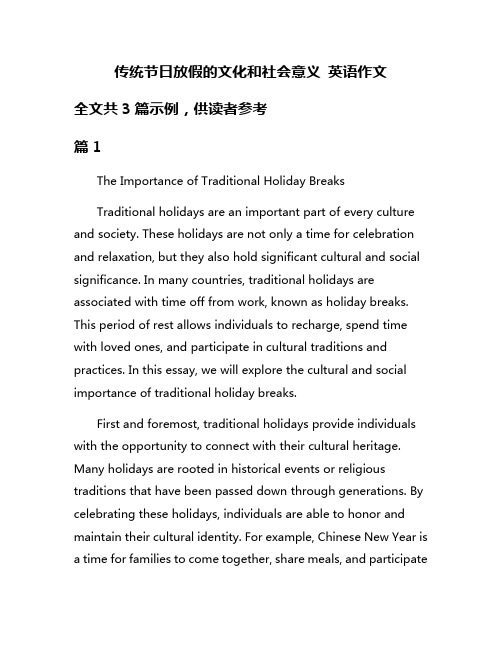
传统节日放假的文化和社会意义英语作文全文共3篇示例,供读者参考篇1The Importance of Traditional Holiday BreaksTraditional holidays are an important part of every culture and society. These holidays are not only a time for celebration and relaxation, but they also hold significant cultural and social significance. In many countries, traditional holidays are associated with time off from work, known as holiday breaks. This period of rest allows individuals to recharge, spend time with loved ones, and participate in cultural traditions and practices. In this essay, we will explore the cultural and social importance of traditional holiday breaks.First and foremost, traditional holidays provide individuals with the opportunity to connect with their cultural heritage. Many holidays are rooted in historical events or religious traditions that have been passed down through generations. By celebrating these holidays, individuals are able to honor and maintain their cultural identity. For example, Chinese New Year is a time for families to come together, share meals, and participatein traditional customs like giving red envelopes and dragon dances. These rituals not only bring joy and excitement but also help to preserve Chinese cultural traditions.Furthermore, traditional holiday breaks allow individuals to take a break from their busy lives and prioritize their mental and physical well-being. In today's fast-paced world, many people are overworked and stressed, leading to burnout and mental health issues. Holiday breaks provide a much-needed respite from the daily grind, allowing individuals to relax, unwind, and focus on self-care. Whether it's taking a vacation, spending time with loved ones, or simply enjoying a day off, traditional holidays offer a chance to recharge and rejuvenate.Additionally, traditional holiday breaks serve as a time for community building and social cohesion. During holidays, people come together to celebrate, share meals, and participate in cultural activities. These shared experiences foster a sense of belonging and unity among individuals, strengthening social bonds and creating a sense of community. For example, during Thanksgiving in the United States, families and friends gather to give thanks, share a meal, and reflect on their blessings. This tradition promotes gratitude and appreciation for loved ones, creating a strong sense of community.Moreover, traditional holiday breaks have economic implications as well. Many businesses and industries rely on holiday seasons for increased sales and revenue. For example, the retail industry sees a boost in sales during Christmas and New Year's as people shop for gifts and festive decorations. Similarly, the tourism industry benefits from holiday breaks as families travel to different destinations for vacations and getaways. These economic activities stimulate growth and support local businesses, contributing to the overall prosperity of the society.In conclusion, traditional holiday breaks play a crucial role in preserving cultural heritage, promoting well-being, fostering social cohesion, and stimulating economic activity. The significance of these holidays goes beyond just a day off from work; they are an integral part of our cultural and social fabric. By celebrating traditional holidays and taking time to rest and rejuvenate, individuals can connect with their roots, strengthen relationships, and contribute to the overall well-being of society. As we continue to embrace and honor our cultural traditions, we can uphold the values and customs that have been passed down through generations, ensuring a brighter and more unified future for all.篇2Traditional festivals are an integral part of culture in many societies around the world. In addition to providing a break from daily routines, these festivals also serve important cultural and social functions. One such function is the observance of public holidays during traditional festivals.In many countries, public holidays are declared during major traditional festivals such as Christmas, Diwali, Chinese New Year, and Eid. These holidays allow individuals to take time off from work or school to celebrate and participate in cultural and religious activities. Additionally, public holidays during traditional festivals provide an opportunity for families and communities to come together and strengthen their bonds.One of the key cultural significances of public holidays during traditional festivals is the preservation of heritage and customs. By observing these holidays, individuals can pass down traditional practices, rituals, and beliefs to future generations. For example, the celebration of Christmas through family gatherings, gift-giving, and attending religious services helps to reinforce the Christian heritage and values in many societies. Similarly, the observance of Diwali with rituals such as lighting oillamps, exchanging sweets, and performing puja helps to preserve the Hindu culture and traditions.Moreover, public holidays during traditional festivals also play a vital role in promoting social cohesion and unity. These holidays bring people from diverse backgrounds together to celebrate shared traditions and values. For instance, the Chinese New Year holiday in many countries is marked by dragon parades, family reunions, and festive meals, which foster a sense of community and belonging among the Chinese diaspora. Likewise, the Eid holiday in Islamic countries is a time for Muslims to come together for prayer, feasting, and charitable acts, promoting solidarity and goodwill among believers.Furthermore, public holidays during traditional festivals have economic implications as well. These holidays often lead to increased spending on food, gifts, decorations, and travel, which boosts the local economy. Many businesses also benefit from the surge in demand for products and services during festive seasons. For example, retailers experience a boom in sales during Christmas, while restaurants and hotels see higher bookings during Chinese New Year. As a result, public holidays during traditional festivals contribute to economic growth and stimulate consumer activities.In conclusion, public holidays during traditional festivals serve as a significant cultural and social practice in many societies. They help in preserving heritage, fostering social cohesion, and stimulating economic activities. By observing these holidays, individuals not only celebrate their cultural identity but also contribute to the collective well-being of their communities. As such, public holidays during traditional festivals hold great cultural and social significance in today's globalized world.篇3The Cultural and Social Significance of Traditional Holiday BreaksIn many cultures around the world, traditional holidays are marked by days off from work or school. These breaks are more than just a chance to relax and unwind – they hold deep cultural and social significance that connects individuals to their heritage and community. In this essay, we will explore the cultural and social importance of traditional holiday breaks.First and foremost, traditional holiday breaks provide individuals with an opportunity to connect with their cultural roots. Many holidays have their origins in religious or historicalevents that are important to a particular culture or community. By taking time off to celebrate these holidays, individuals can reaffirm their connection to their heritage and participate in rituals and traditions that have been passed down through generations. This connection to cultural roots helps to build a sense of identity and belonging among individuals, strengthening their ties to their community.Additionally, traditional holiday breaks serve as a time for reflection and gratitude. Many holidays are centered around themes of giving thanks, forgiveness, and renewal. By taking a break from the hustle and bustle of daily life, individuals are able to pause and reflect on what is truly important to them. This reflection can lead to increased feelings of gratitude and appreciation for the people and things in their lives, fostering a sense of community and interconnectedness.Moreover, traditional holiday breaks provide an opportunity for social bonding and connection. Holidays are often celebrated with family, friends, and community members, creating opportunities for people to come together and strengthen their relationships. These gatherings not only provide a sense of joy and camaraderie, but also allow individuals to support each other, share experiences, and create lasting memories. In thisway, traditional holiday breaks play a crucial role in building social cohesion and unity within communities.In addition to their cultural and social significance, traditional holiday breaks also have practical benefits for individuals and societies. Taking time off to celebrate holidays can help to reduce stress, improve mental health, and increase productivity. Studies have shown that regular breaks from work or school can lead to higher levels of job satisfaction, better academic performance, and improved overall well-being. By providing individuals with the opportunity to rest, recharge, and connect with others, traditional holiday breaks contribute to a healthier and more balanced lifestyle.In conclusion, traditional holiday breaks hold immense cultural and social significance that goes far beyond their role as days off from work or school. By connecting individuals to their cultural roots, fostering reflection and gratitude, promoting social bonding and connection, and providing practical benefits for individuals and societies, traditional holiday breaks play a vital role in shaping the fabric of communities around the world. As we continue to celebrate and honor these holidays, we can strengthen our sense of identity, build connections with others, and create a more harmonious and cohesive society.。
我最喜欢的传统节假日英语作文

我最喜欢的传统节假日:春节**The Spring Festival: My Favorite TraditionalHoliday**As the old saying goes, "A year's plan starts with Spring," the Spring Festival, also known as the Chinese New Year, is the most anticipated and celebrated holiday in China. It symbolizes the beginning of a new year, bringing joy, hope, and prosperity to families across the country. The Spring Festival is steeped in rich cultural traditions that have been passed down through generations. One of the most distinctive customs is the "New Year's Eve Reunion Dinner," a family meal where family members gather to share a meal and bid farewell to the old year. This meal is considered a symbol of family unity and is often filled with delicious dishes that are considered auspicious, such as fish, which represents abundance, and dumplings, which symbolize wealth.The festival is also marked by the giving of red envelopes, known as "hongbao," which are usually given to children and young people by elders as a symbol of goodluck and blessings. These red envelopes are often filled with money, and receiving them is a highlight of the holiday for many children.Another important custom is the cleaning of the house before the New Year, known as "sweeping the dust." This is done to rid the home of bad luck and make way for good luck in the new year. Homes are thoroughly cleaned, and windows and doors are decorated with red paper cutouts and couplets with auspicious sayings.The Spring Festival is also a time for fireworks and lanterns, which add a festive and vibrant atmosphere to the celebration. The bright colors and loud noises of the fireworks symbolize the joy and excitement of the occasion, while the lanterns, often shaped like animals or flowers, are a beautiful sight to behold.For me, the Spring Festival is not just a time for family reunions and feasting, but also a time forreflection and setting goals for the new year. It is a reminder of the importance of family, tradition, and the spirit of unity and hope that can bring joy and prosperity to our lives.The Spring Festival is truly a remarkable holiday that embodies the essence of Chinese culture. It is a time for joy, celebration, and reflection, and it is my favorite traditional holiday because it brings my family and me together, filled with warmth, love, and hope for the year ahead.**我最喜欢的传统节假日:春节**春节,又称为中国新年,是中国人最期待、最盛大的节日。
- 1、下载文档前请自行甄别文档内容的完整性,平台不提供额外的编辑、内容补充、找答案等附加服务。
- 2、"仅部分预览"的文档,不可在线预览部分如存在完整性等问题,可反馈申请退款(可完整预览的文档不适用该条件!)。
- 3、如文档侵犯您的权益,请联系客服反馈,我们会尽快为您处理(人工客服工作时间:9:00-18:30)。
2018年高考全国卷英语作文预测系列范文(一)传统节假日
传统节假日类:Passage 1 (中秋节)假定你是李华,随着中秋节临近,你校将组织庆祝中秋节活动。
外教Lucy一直都热衷于中国传统文化,请写信邀请她。
内容包括:1. 活动时间与地点2. 中秋习俗及庆祝活动注意:1. 词数100左右;2. 可以适当增加细节,以使行文连贯;Dear Lucy,I’m writing to invite you to our Mid-Autumn Festival celebration, due to the fact that you are always keen on Chinese culture. The celebration is to be held on the playground at 8 o’clock this Wednesday night.As is well known, the Mid-Autumn Festival falls on the 15th day of the eighth lunar month, a time for family reunion or for family members sharing the same brilliant moon thousands of miles away. On this charming night, our holiday celebration involves launching floating sky lanterns called Kongming and appreciating the bright full moon with a variety of delicious moon cakes at hand. Everyone present, I believe, will undoubtedly enjoy thorough refreshment, immersed in the unforgettable traditional atmosphere. I hope you can come and join us.I would be more than grateful if you could write back soon.Yours,Li Hua传统节假日类:Passage 2(端午节)假定你是李华。
想邀请外教Charlie参加学生会举办的端午节庆祝活动。
请给他写封邮件。
内容包括:1. 简要介绍端午节;2. 活动时间、
地点和内容。
注意:1. 词数100左右;2. 可适当增加细节,以使行文连贯;3. 端午节(the Dragon Boat Festival)。
Dear Charlie,I’m LiHua, president of the Student Union. I’m writing to invite you to our Dragon Boat Festival celebration, which is to be held in the Lecture Hall at 14:00 next Monday.The Duanwu or Dragon Boat Festival, generally celebrated on the fifth month of the Chinese lunar calender, falls on June 18 this year. It is one of the oldest festivals in China, with a history of more than 2,000 years. Legend holds that this festival is in memory of Qu Yuan, a patriotic poet during the Warring States Period.In the celebration, you can enjoy a performance about that legend and watch live broadcast of dragon boat racing. In the meanwhile, varieties of Zongzi, an essential food for this unique occasion, are available, which take different shapes and various fillings. Come and join us!Your early reply is highly
appreciated!Yours,Li Hua传统节假日类:Passage 3 (元宵节)假定你是李华,校学生会主席。
得知英国交换生Peter对中国传统节日非常有兴趣,想邀请他参加学生会举办的元宵节(the Lantern Festival)庆祝活动。
请给他写封邮件。
内容包括:1. 时间和地点;2. 内容(赏灯、猜灯谜、吃元宵等)。
注意:1. 词数100左右;2. 可适当增加细节,以使行文连贯。
Dear Peter,Knowing that
you take a great fancy to Chinese traditional festivals, I would love to invite you to join us in the coming Lantern Festival celebration.The celebration, organized by the Student Union, is to be held at 7:00 p.m. next Wednesday in the school garden. As is well known, the Lantern Festival falls on the 15th day of the 1st lunar month, which is regarded as the most recreational among all the Chinese festivals. You are bound to be entertained and dazzled by a wide range of colorful activities, including watching lanterns of various shapes and sizes, guessing lantern riddles, enjoying folkdances, and eatingYuanxiao.Not to be missed! Come and experience this magnificentfestival with us!Yours,Li Hua。
